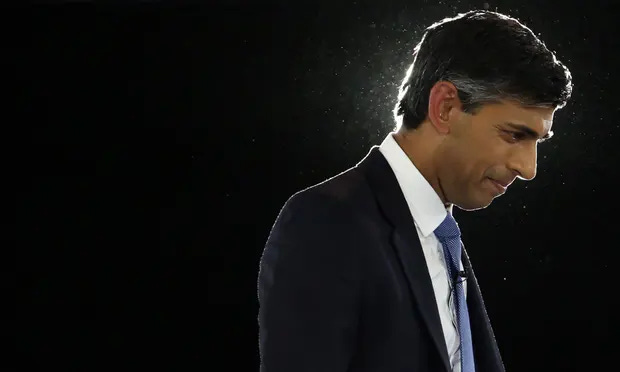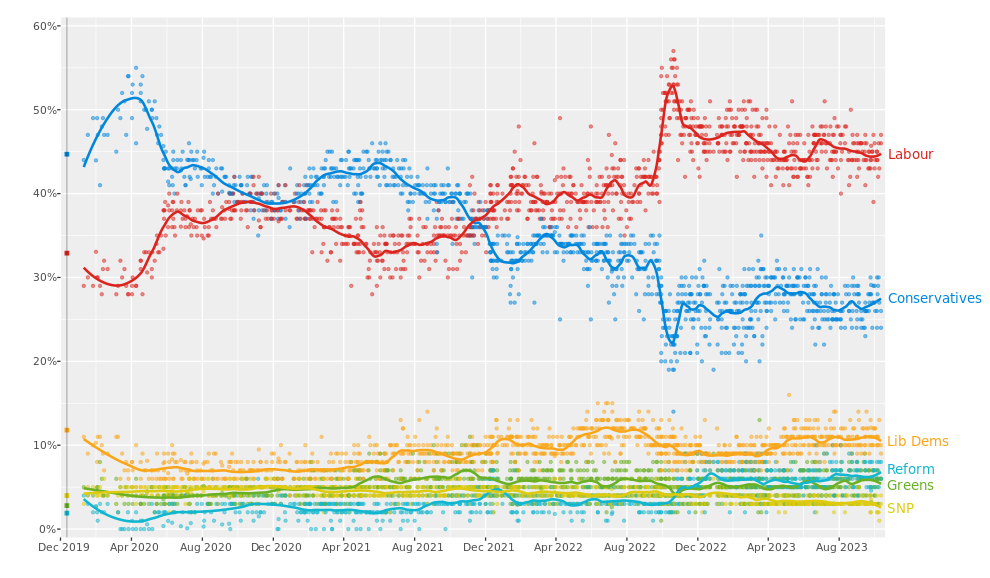Mark It On Your Calendars: The Conservatives Are Hurlting Towards A Snap, Spring Election
Following the recent policy blitz at their conference, it is looking more likely that Rishi Sunak is hoping to call an election for May 2024.
The date of an election can change everything. Just ask James Callaghan, the Labour prime minister between 1976 and 1979.
In the autumn of 1978, Labour was high in the polls, leading the Conservatives by an average of 2-3 points. The economy was slowly recovering from the 1976 IMF Crisis, and Callaghan enjoyed high approval ratings with the general public. So, when Labour held its scheduled party conference in September, many pundits expected a snap election to be called. To the surprise of everyone, that announcement was never made – an error Callaghan soon regretted when the Winter of Discontent gripped the country several months later, plunging the UK into a period of high energy prices and waste piling up on the streets, leading to the erosion of Labour’s poll lead and tarnishing Callaghan’s reputation forever. The Conservatives would go on to decisively defeat Labour at the next election, the next year.
30 years later, Gordon Brown repeated the same mistake, when he refused to call a snap election for the autumn of 2007. At the time, he had just succeeded Tony Blair and Labour had shot back up in the polls. His approval ratings and poll lead quickly evaporated, however, following the 2008 financial crisis and Labour, once again, lost the next election in 2010.
This same conundrum now plagues Rishi Sunak. With a year to go until the next election, and his party still trailing far behind in the polls, the onus is now on him to decide on the next election date.
Legally, the latest possible time he can call one is January 2025, but a winter campaign is unappealing to all parties involved. Campaigners don’t want to trudge through snow and sludge to go canvassing, and since this is the time the NHS usually buckles under the weight of the winter flu, it would be political suicide for any government to hold campaigns under those circumstances. Summer, meanwhile, presents the inverse problem – people would rather go on holiday, enjoying the sweltering hot weather, than be inundated with slogans or debates.
Thus, Sunak is left with two possibilities – holding it in either Spring or Autumn.
Autumn does have its benefits. It gives the government more time to enact popular policies designed to woo over the public and, barring any other external events, the inflation rate should continue to fall drastically by that point, giving him the opportunity to showcase how his ministry has helped families and consumers through the cost of living crisis. However, the longer wait has its fair share of drawbacks too. High-interest rates may cripple consumer spending, leading to economic stagnation; the worsening housing bubble can explode at any moment; and the government risks looking more like a zombie administration, dragging its term to an unwanted time duration.
Considering all of the above, I believe a spring election is in the Conservatives’ best interests, and thus, the most likely date of the next British general election. Here are just a few of the ways spring is a more favourable political environment to Rishi Sunak:
The government is expected to win the Rwanda High Court case, which would likely give them a slight boost in the polls, especially with their more extreme supporters, most of whom have begun migrating to Reform UK. Winning Rwanda would allow them to reclaim the mantra of dealing with illegal immigration and rally the conservative faithful.
Small boat migration is usually at its lowest in the spring when the winter conditions make it inhospitable to cross the channel. Conservatives can capitalise on this and claim the issue has been resolved.
If the party wants to curry favour with the public, Chancellor Jeremy Hunt may be tempted to include a few pledges designed to win people over - tax cuts, energy price freezes, etc. in the spring budget, scheduled for early March.
Holding the election in May will coincide with that year’s local elections. Voters, who may not have been motivated to vote for the Conservatives in a general election, may decide to vote for their local conservative representation who they like and since they’re in the voting booth may decide on ticking the box next to the Conservatives - after all, it’s only a piece a paper. Now, this logic is entirely dependent on a lot of ‘mays’ taking place in May, but for the Conservatives at this stage, hope might just be their last saving grace. In London, it also gives the party the opportunity to salvage a few of their most vulnerable seats by running on an anti-ULEZ, anti-Khan campaign, just as they did in Uxbridge.
If Sunak does decide to hold it in May, as I suspect he plans to, that means he has less than 7 months to defy political history and lead the Conservatives to a historic fifth consecutive election victory. Or at least mitigate the worsening conditions and narrow the poll gap with Labour. It is not an envious position.



